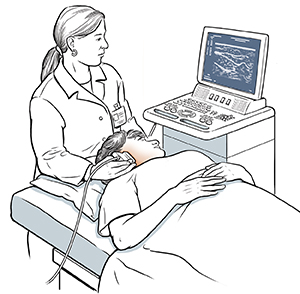Doppler Ultrasound
Doppler ultrasound uses harmless sound waves to view pictures of blood flow inside your blood vessels. This test can find narrow or blocked arteries and veins.
How do I get ready for an ultrasound?
The test takes 30 to 60 minutes. Allow time to check in. When you arrive, you may be asked to undress from the waist down or to change into a gown. The person who does the ultrasound is called a sonographer.
What to tell the sonographer
Tell your sonographer if:
What happens during an ultrasound?
The ultrasound may be done on your neck, abdomen, leg, or arm. This depends where the problem is.
 |
| You may feel pressure during the test. You may also hear a |
If the test is done on your neck
-
You will lie on an exam table.
-
Your head will be turned to the side.
-
Nongreasy gel will be applied to your neck.
-
The sonographer will then press a hand-held transducer (probe) against your neck.
If the test is done on your abdomen, leg, or arm
Although the sonographer can answer questions about the test, only a doctor can explain the results.
Your test results
Before leaving, you may need to wait briefly while your images are being reviewed. Your doctor will discuss the test results with you during a follow-up appointment or over the phone.
Your next appointment is:____________________